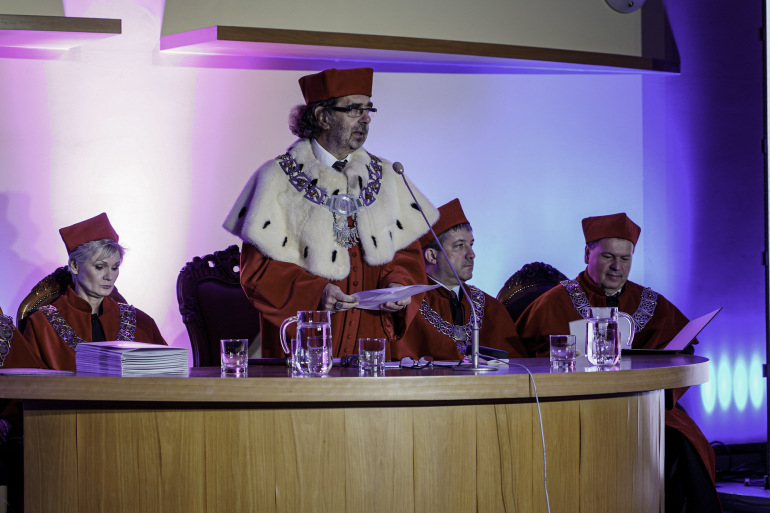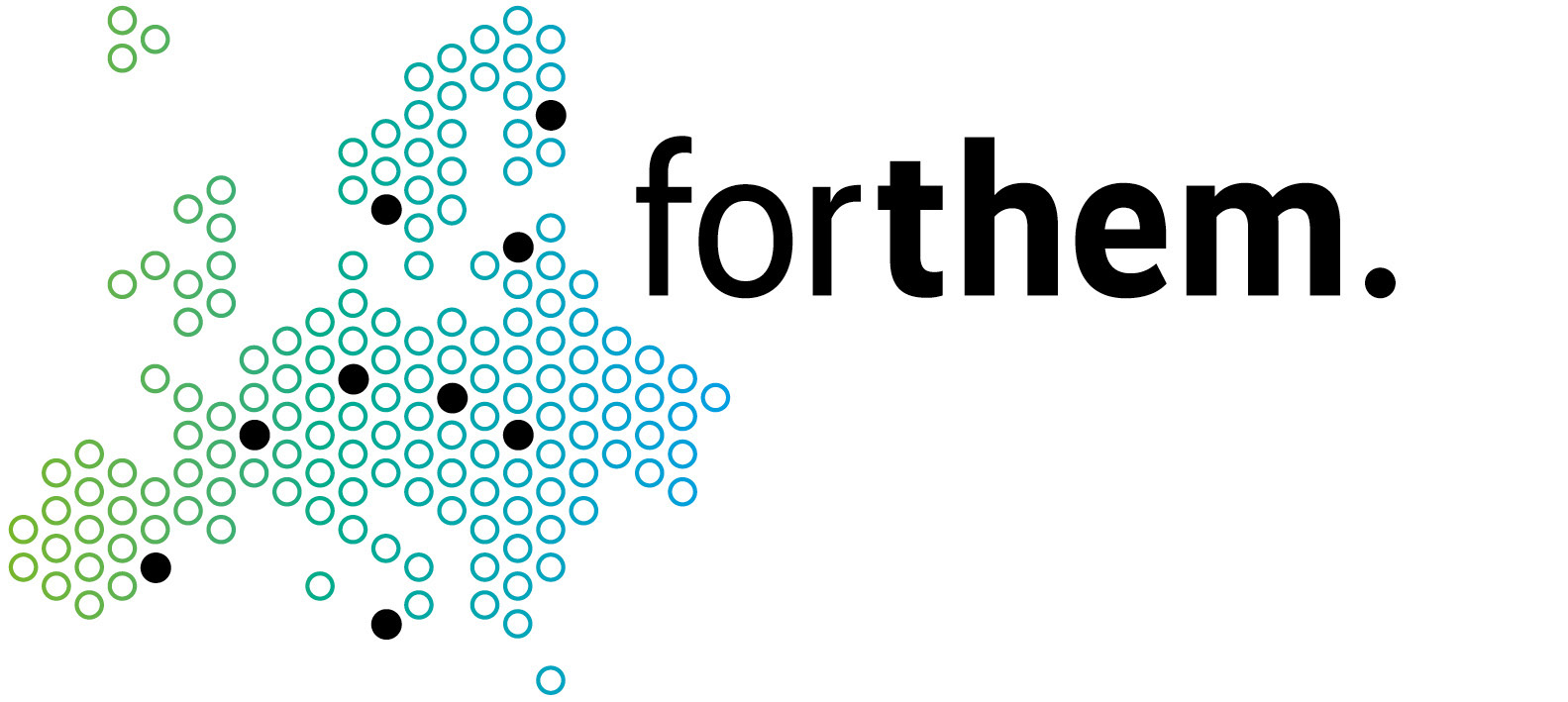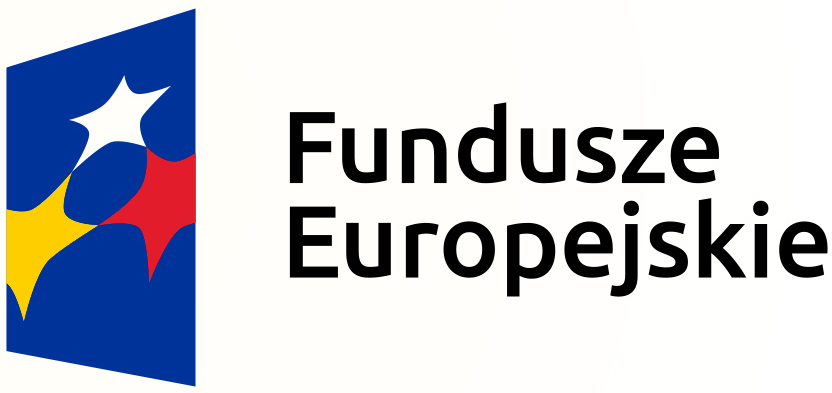Rector: 'Make good use of the space of freedom'

‘I wish myself and you - academic teachers, students and doctoral students, administrative employees - that we make good use of the space of freedom in which we live, learn and work. While freedom is still here and may it last forever,’ said Professor Marek Masnyk, Rector of the University of Opole, during the ceremonial inauguration of the academic year 2023/2024.
The inauguration took place on October 3, 2023 in the Auditorium Hall of the UO Faculty of Theology. It was attended by employees, students and alumni of the University of Opole, representatives of the world of science, culture, church, local government and politics. The ceremony began with an address by the Rector, Prof. Marek Masnyk.
The Rector commenced his speech by remembering those who had passed away in the past academic year, honouring their memory with a minute's silence. He then went on to talk about, inter alia, the EU projects implemented by the university and the academic community, exchanges, as well as scientific, teaching and infrastructural projects. He mentioned a new Research Centre, opened in November 2022, which includes the University Clinical Research Support Centre and the Centre for Research and Innovation in Civilisation Diseases, or the International Research and Development Centre for Agriculture and Food Industry, which was opened in June 2023.
‘This year's inauguration of the academic year is, however, particularly special for me. Firstly because it falls in the anniversary year of our university,’ said Prof. Masnyk. ‘ It marks the end of a very important stage in the history of the university, which we can boldly call the time of dreams coming true , and we can say that we have managed to realise the dreams of our predecessors, and that there is reason for pride and satisfaction. I would like at this special moment to address words of appreciation and thanks to the entire university community - academics, students, doctoral students and administrative staff - that we have been able to work together, in harmony and internal harmony, to make our dreams a reality, even though there has been some turbulence here and there.
‘There is also another reason why this year's inauguration of the academic year is special for me, added the Rector. ‘This is the eighth inauguration that I have the honour and pleasure to conduct. It means a real, and not merely symbolic (...), farewell to the university with which I have been associated for almost half a century. With the university that has become my second, if not my first, home. (...) Next year at this time, I will be present at the inauguration of a new academic year, but only to hand over to my successor, the seventh in the history of the University of Opole, the insignia of the rector's authority, the attributes of dignity, power and honour. (...) It seems to me, and I have the right to think so, that I am leaving the university at an excellent moment of its development.’
The Rector also referred to the successful evaluation of seventeen scientific disciplines completed last year. ‘Finally, after considering the appeals, we received one A+, six A and ten B+ categories,’ he said. ‘This means that in each of the seventeen disciplines our university has full academic rights, i.e. maintained and acquired the right to confer doctoral and postdoctoral degrees, and we also have full autonomy in shaping our educational policy. The results of the "Perspektywy" Educational Foundation Ranking are also a reason to be proud of. (...) This success is the result of the tremendous work of the whole team: all university employees, deans, and institute directors. It does not mean that we should fall into euphoria. We are pleased, but we are also aware of what we still need to improve. (...) I don't judge it in terms of personal success either, but I am pleased to leave the university in a very good shape.
Among other things, the Rector also spoke about the educational opportunities offered by the university, its well-developed cooperation with foreign universities, study programmes giving an opportunity to obtain diplomas not only from the UO but also from foreign universities, the UO's participation in the network of European Universities starting in 2019 and the main prize awarded to the UO in the competition 'European Universities - Alliances of the Future'.
‘Dear students, I congratulate you on the choice of your field of study,’ emphasised Professor Marek Masnyk. ‘The university with which you have decided to bind your future is the oldest and best university in the region, a university with a 70-year tradition, ranked seventh in the latest rating of Polish universities. Grzegorz Skawiński, the leader of ‘Kombi’, a band still popular with young people, sang almost nineteen years ago, the year in which you were born: ‘Every generation has its own time, every generation wants to change the world’. And I am telling you: this is the time. Your time - literally and figuratively. Do not waste it. Make the most of it. I wish you the joy of studying and the fulfilment of your passions and dreams. Take advantage of the rich educational, scientific, cultural and sporting offer.
‘What can you wish the academic community on the threshold of a new academic year and on the eve of the 30th anniversary?’ asked the Rector.
‘I wish myself and all of you - academic teachers, students and doctoral students, administrative staff - that we make the best use of the space of freedom in which we live, learn and work. As long as there is still freedom, and may it last forever,’ he said. ‘The uniqueness of the academic world lies in the fact that we are different and yet we are able to show respect for any difference. We have different political views, we differ in our attitude to religion, in our worldview, but we are united in respecting the values that are and will remain the foundation of the academic ethos: responsibility, kindness, justice, tolerance, freedom of science and freedom of scholars. These values must be protected like the apple of the eye. I trust, and this is a message to our students, because I know that you are socially mature enough to protect and defend these values. For only in this way can we fully define ourselves as a European university - a university open to the world, free of xenophobia, accepting of diversity, respectful of every human being, a university of wise and courageous people. It is up to you what our country will be like tomorrow, in five, ten and more years.’
Then, representatives of the government, local authorities, and the church took the floor.
‘The University of Opole, now in its thirtieth year, has become a permanent feature on the map of Polish universities and has very clear successes, as the rector mentioned in his report," said the Deputy Voivode, Tomasz Witkowski. ‘They show that the academic nature of Opole is primarily centred around the university, the largest university in the city and the entire Opole region. More and more students are coming here as first-choice students, and it confirms the very diligent work of the entire academic staff.'
The Vice-Marshal of the Opole
Voivodeship, Zuzanna Donath-Kasiura, congratulated the UO on its high
position in the rankings and on the successful evaluation, scientific
achievements and social commitment, both of the research and teaching staff and
all students. ‘You are a unique regional community, a unique community of
people. You are the intellectual elite of our region. Here you have access to
the minds of young people, and you can teach at a world-class level. You shape
sensitivity and openness. You show how the unexplored can be explored. You have
an impact on shaping young people's attitudes too. You are able to combine
philosophical discussions about the sense of life with a vision and a need for
action,’ she said. ‘Science only thrives in a society of free people open to
values. Your students are people who not only
deepen their knowledge, but also get involved in many student organisations.
And for this I thank you very much, because this is the real processes of building
of civil society.'
The Vice-Mayor of Opole, Maciej Wujec, said that ‘it is necessary to constantly remind not only those in power, but also society that without science, without knowledge, without development, without new technologies, there is no strong state. Social policy, economic or historical policy are very important. But without thinking ahead, without anticipating trends in the world of modern technology, we will be forced to buy these technologies from abroad. This is why I think that a serious discussion is needed about what is the strategy of Poland in terms of the development of science and the most important directions. What we need to do to keep young people here in the country. The second thought is a little more positive. We in Opole know that without a university, without a strong academic community, there is simply no strong and modern Opole. All the achievements that the rector has mentioned fill us with great pride. These last eight years have certainly been a golden era for the University of Opole. Great respect is due to the rector and his team in this regard. Dear students, you are at a wonderful university, which educates at a very high level.’
The Auxiliary Bishop of the Diocese of Opole, Rev. Rudolf Pierskała, in his speech, referred to the university's coat of arms, which features half an eagle and half a cross. ‘I think that this coat of arms obliges us to preserve the great Christian heritage of this land, the culture of the people who were active here, because, after all, this university was created from a merger of the Higher School of Pedagogy and a branch of the Catholic University of Lublin,' he said. ‘The second part of the coat of arms, the half eagle, also obliges us, above all, to serve our homeland.
The Vice-Rector for Science, Prof. Jacek Lipok, presented numerous congratulatory letters and good wishes sent to the UO on the occasion of the inauguration of the next academic year, among others, from the rectors of other universities and representatives of central authorities.
Then, the Vice-Rector for Academic and Student Affairs, Prof. Izabella Pisarek, conducted the oath-taking ceremony for students and doctoral students. ‘Today we are adding nearly 3,200 people to the list of students at the University of Opole,’ she said. ‘ I wish you, when you receive your diplomas from our university, to be able to say that you made a good choice, which I deeply believe you did. The University of Opole, our academic community, welcomes you today to our university family. As in any family, you will be given your place, your rights privileges, but also your duties.
The ceremony was followed by speeches of the presidents of the Students’ Union and Doctoral Students’ Union:
‘Today is a special day, especially for those who are just joining our academic community,’ said Franciszek Posacki, President of the Students' Union. ‘I assure you that you have made the best choice. (...) Each and every one of you has unique skills, passions and predispositions that you will be able to develop within the walls of our university. Someone recently asked me why it was worth studying at the University of Opole, and I said without a moment's hesitation that it was because of the wonderful people. (...) We have people at our university with a lot of experience, passion and success, which they are willing to share.
This year's inaugural lecture, entitled ‘The end of exodus from the region? Youth on the labour market yesterday and today’, was delivered by Prof. Romuald Jończy. ‘Shortly after Poland's accession to the European Union, I had the pleasure of delivering an inaugural lecture at this university. It was devoted to a similar topic, though a completely different situation,’ said Prof. Jończy. ‘At that time, our region was an area of mass foreign migration, and Poland was in the midst of a peak in post-accession migration. Today I would like to focus on what has changed since then, because more has changed than anyone could have guessed.’
At the beginning, he briefly explained the principles of the labour market and discussed the demographic changes that have taken place in recent decades. ‘To put it succinctly, there were many young people when Poland joined the European Union and now there are half as many. This is the case throughout the country, but it looks much worse on the peripheries,’ he explained.
Another aspect that has changed over the years is the labour market resources: years ago there was unemployment, now there is a shortage of workers. According to Prof. Jończy, this is due to three factors: the fact that the number of people retiring from the labour market is about twice as high as the number of people entering it; permanent and economic emigration and growth in employment.
‘From the perspective of the labour market, we are facing a huge shortage of workers,’ concluded Prof. Jończy. ‘Over the next 25 years, it is estimated that Poland will lack between 3 and 5 million people. (...) The problem will be to fill, in particular, those so-called inferior jobs, which will be vacated by retiring, less educated people. There is rather little doubt, although it is not being said out loud, what is the only real way, at least in the short-term, to address the problems of the labour market and depopulation. Although it sounds bizarre: the problem is not that we need children, (...) but we need young adults who will take jobs, support us fiscally and probably have children too. The only way to do this is controlled immigration, but on a fairly large scale. The question is not whether it should happen, because it is inevitable and is already happening, albeit in waves. The question is how to control it, so as not to cause social and cultural perturbations or lose an election. The question is whether we want just workers or families with children. Let's bear in mind that many businesses and industries only operate thanks to immigrants. And that this is only due to the crisis across the eastern border, which started not a year but a decade ago. Without that crisis, without the depreciation of the hryvnia, we would not have Ukrainians here patching up our labour market. But all it takes is for Western Europe to open its borders to them and they might not be here.
Video clip (Filip Ożarowski)
Photos (Sylwester Koral)



